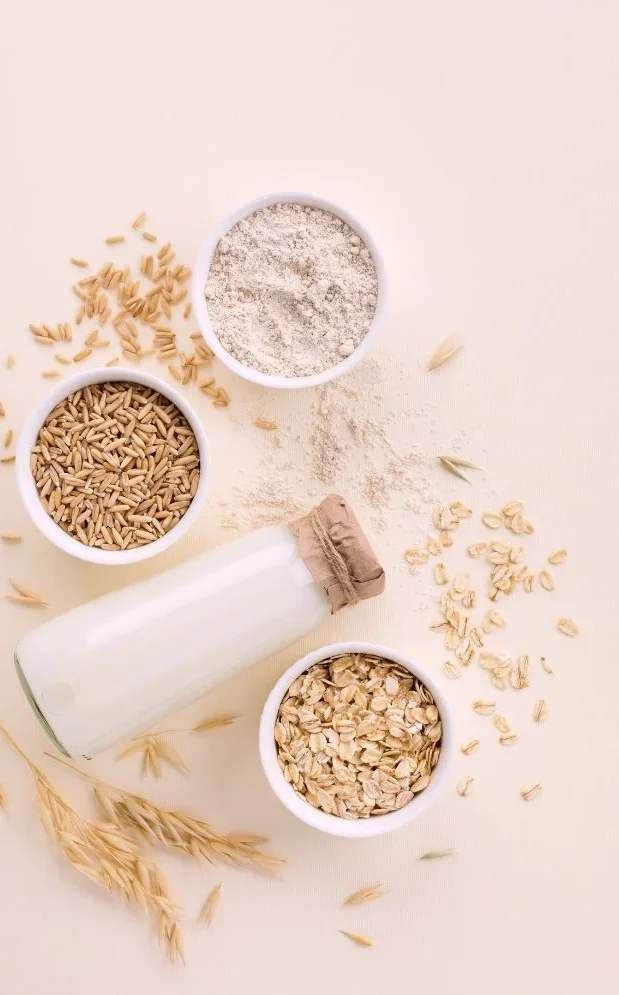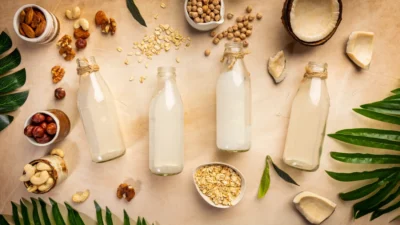Is Drinking Oat Milk A Risk To Our Health?

Dr Rebecca Jones GP sets the record straight on oat milk, with additional research from Viva!’s Dr Justine Butler
As a vegan, I’m never surprised when plant-based foods and alternatives come under attack from the media.
It’s been going on for many years, but the recent attacks on oat milk have seemed to be a little more sustained than previously. And, worryingly, on the surface, there seems to be some scientific evidence for the claims. So, what are the oat milk critics saying, and is there any truth in it?
The articles mostly seem to have stemmed from comments made by an author known as ‘The Glucose Goddess’, who has stated that “Oat milk comes from oats, and oats are a grain, and grains are starch. When you’re [drinking] oat milk, you’re [drinking] starch juice. You’re [drinking] juice with a lot of glucose in it. So it leads to a big glucose spike.”
So, what is she referring to? Well, the first thing I need to explain is what happens with sugars and insulin. Carbohydrates in our diet are broken down into glucose, which is used by our cells for energy. Insulin is a hormone which moves glucose out of our bloodstream and into the cells so it can be used, but diabetics have problems with this process. Type 1 diabetics don’t produce any of their own natural insulin and instead use injected insulin to replace it. Type 2 diabetics are people whose tissues have become resistant to insulin, meaning that the sugars stick around in their blood, causing problems like kidney disease, nerve problems, eye disease, heart disease and lots more. Type 2 diabetes is, in part, a disease of lifestyle. This means that it’s related to what we eat, and can, for the most part, be prevented with diet.
So, of course, large fluctuations in blood sugar are concerning for diabetics who are aiming to keep their blood sugars on the lower side, but for those who aren’t diabetic, it really shouldn’t be too much of an issue.
The way we measure how much a food or drink is likely to affect our blood sugars is with the Glycaemic Index (GI). This scoring system, which goes from one to 100, is a way of denoting the extent to which the food makes our blood sugar rise, and how quickly these changes will occur. Lower GI foods have scores nearer to one, and the highest GI foods have scores nearer to 100. Those which are ultra-processed and sugary have a much higher GI than low-sugar, unprocessed foods. Oat milk has a GI of 69, making it a medium GI food, compared to dairy milk which has a low GI of 31.
Of course, eating lots of high GI foods very frequently isn’t a great idea even for non-diabetics, because there is an association with a higher risk of diabetes later in life. But I think it’s really important to consider the bigger picture here. People who follow a healthy vegan diet are far less likely to go on to develop type 2 diabetes, with some studies showing an astounding risk reduction of over 60 per cent in vegans!
The health benefits of oats
Oats are a good source of protein compared to other grains and provide many vitamins and minerals, such as manganese, phosphorus, copper, B vitamins, iron, selenium, magnesium and zinc. They contain a special type of soluble fibre called beta-glucan that can help reduce cholesterol levels, particularly LDL ‘bad’ cholesterol, which in turn helps lower the risk of heart disease. Because of the viscosity (stickiness) of beta-glucans from oats, they can help balance blood sugar levels by slowing down glucose absorption and improving insulin sensitivity. This makes oats particularly beneficial for people with type 2 diabetes or those at risk of developing it. Oats are also rich in prebiotic fibre that promotes the growth of beneficial gut bacteria and a healthy microbiome offers many health benefits. The fibre in oats also supports regular bowel movements and can help reduce constipation and lower the risk of bowel cancer.
By including oats in your diet, you can improve your overall health and reduce the risk of various chronic diseases. It’s preferable to choose less processed types of oats and avoid adding sugar. While steel-cut and rolled oats have a medium GI score of about 53 and 57, respectively, instant oats have a high GI score of 83. So, it’s better to opt for the less processed steel-cut or rolled oats. You can further slow the speed at which their glucose is released by adding fruit, nuts and nut butter to your porridge. The extra protein, fibre and healthy fats slow the release of glucose.
Oats and oat milk are a bit different from each other in that oat milk only contains around 10 per cent of oats and is mostly water. Most oat milks (except organic) are fortified with vitamins and minerals, providing similar amounts of calcium, vitamin B12 and iodine as cow’s milk. Most fortified oat milks also contain vitamin D. In the UK, cow’s milk is not a good source of vitamin D because it is not fortified, as it is in some other countries. So, by choosing oat milk, you will not be missing out on nutrients.

A comparison of nutrients in cow’s milk and selected plant milks
| Cow’s milk | Alpro soya | Oatly semi | Alpro almond | |
|---|---|---|---|---|
| Calcium (mg) | 120 | 120 | 120 | 120 |
| Vitamin B12 (μg) | 0.3-0.5* | 0.38 | 0.38 | 0.38 |
| Iodine (μg) | 23-34* | 22.5 | 22.5 | 22.5 |
| Vitamin D (μg) | Trace | 0.75 | 1.1 | 0.75 |
| Fibre (g) | 0 | 0.6 | 0.8 | 0.3 |
| Protein (g) | 3.5 | 3.3 | 1.1 | 0.5 |
| Fat (g) | 1.7 | 1.9 | 1.5 | 1.1 |
| Saturated fat (g) | 1.1 | 0.3 | 0.2 | 0.1 |
Source: Retail outlets and *Office for Health Improvement & Disparities nutritional analysis (2025).
The overall evidence shows that oats are good for heart health because they can help lower cholesterol and control blood glucose, among other beneficial effects.
Dairy isn’t the answer
Considering all of this, consuming a small amount of oat milk as part of a generally healthy, plant-based diet shouldn’t be too much of a concern to anybody, diabetic or not. If you’re still concerned about oat milk and its medium GI score, rushing back to dairy isn’t likely to be the answer. If we’re considering just human health, we need to consider the fact that dairy milk has been associated with prostate cancer, and that full fat dairy is also rich in saturated fat, which is known to cause cardiovascular disease and has been linked with some cancers. Some studies have shown that switching to soya milk can improve measures of health such as blood lipid levels and blood pressure, which can, in turn, reduce the risk of cardiometabolic diseases, like diabetes, amongst other conditions. There is even evidence that switching to soya milk may reduce the risk of breast cancer by 32 per cent. And, interestingly, soya milk has a GI of 30, meaning it has even less impact on our blood sugar than cow’s milk.
Of course, vegans aren’t just considering our health when we cut dairy out of our diets. It’s narrow-minded to think only about the potential downsides of oat milk on our health, when there is far more at stake to continuing consuming dairy. Most vegans have animal welfare in mind when we stop drinking milk. Being complicit in the death of around 60,000 male calves per year just so we can drink their mothers’ milk is non-negotiable. Continuing to drink cow’s milk in 2025 is just unfathomable when we stop to think about all of the alternatives on the market, the fact that around 70 per cent of the world’s population is lactose intolerant, and that we really don’t need to drink milk beyond infancy to achieve our calcium requirements.
There are also many environmental concerns regarding the dairy industry. Cow’s milk is responsible for 3.5 times the greenhouse gas emissions of oat milk, a staggering 12 times the land use of oat milk, and an equally shocking 13 times the water use. In fact, all of the plant and nut milks are far less harmful to the environment than dairy, so if the choice is between a small rise in my blood sugar or animal cruelty and the destruction of our planet, I’ll take the oat milk on my cereal, thanks.







